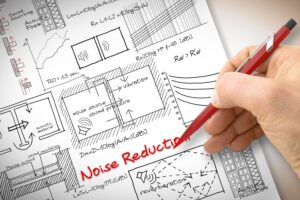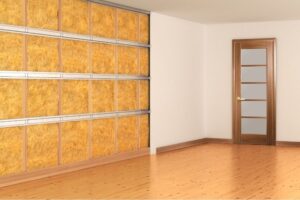Soundproofing your home has become an essential priority for many homeowners in today's fast-paced urban lifestyle. As cities grow denser and homes are constructed closer together, the frequency of noise disturbances has risen dramatically. Many contemporary houses are built using lighter materials, such as stud walls with gypsum board, which often do not provide sufficient insulation against sound transmission. This results in elevated noise levels that can significantly disrupt daily activities, making it crucial for homeowners to explore effective soundproofing solutions that foster peace and tranquility in their living environments.
Homeowners aspire to create a serene atmosphere in their residences, minimizing disruptions and avoiding conflicts with neighbors over noise complaints. Consequently, the demand for innovative and effective soundproofing solutions has surged. With the increasing trend of remote work and home entertainment, the necessity for a calm environment has never been more pressing. Sounds from busy streets, ongoing construction, or even the noise from loud neighbors can severely diminish the quality of life, leading many to seriously consider soundproofing as a practical solution.
The irritation caused by noisy neighbors ranks as the primary motivation for homeowners contemplating soundproofing their residences. The longing for personal space free from unwanted noise is driving a heightened interest in soundproofing options across various home types, particularly in densely populated areas. Homeowners are eager to reclaim their peace and ensure that their homes serve as a refuge from the chaos that often permeates the outside world.
Discover the Compelling Benefits of Soundproofing Your Home
- Enhance your home theater experience dramatically
- Cultivate a productive and focused home office environment
- Ensure tranquil bedrooms conducive to young children's sleep
- Minimize disturbances from traffic noise or nearby train tracks
- Reduce noise pollution if your home is located under an aircraft flight path
- Support shift workers in achieving restful sleep during the day
- Create an ideal sound environment tailored for musicians
Implementing effective soundproofing measures can dramatically elevate your overall quality of life, resulting in a more harmonious and enjoyable living space. Additionally, soundproofing can increase your home’s market value, making it a desirable feature for potential buyers in the future.
Beyond enhancing comfort, soundproofing also boosts the overall energy efficiency of your home, facilitating more consistent heating and cooling throughout your space.
Explore the Profound Advantages of Soundproofing Your Home
With effective soundproofing, you can enjoy your favorite music or movies at any hour without disturbing others in your household or neighborhood. This newfound freedom not only elevates your overall enjoyment but also contributes to a more peaceful coexistence with those around you, fostering better relationships and a sense of community.
Moreover, working from home can become increasingly challenging if you are consistently interrupted by household noise. Soundproofing your home office creates a focused work environment, enabling you to conduct conference calls or webinars without distractions from family members or general household activities.
Maximize the Impact of Soundproofing During Your Home Construction
The most effective and economical approach to achieving a well-soundproofed room is to incorporate soundproofing measures during the initial construction of your home or when undertaking an extension. By prioritizing soundproofing in the early phases, you can avoid costly retrofitting later.
When constructing or renovating your home, ensure that superior soundproofing methods and materials are embedded into the design. Utilizing materials such as acoustic plaster, soundproofing membranes, and mass elastic vinyl can significantly enhance your home's capacity to resist sound transmission and improve overall acoustic performance.
If you need a soundproofed area, such as a recording studio, additional planning will be necessary to create a “room within a room” design. This approach effectively isolates sound and prevents external noise from interfering with your audio projects, ensuring high-quality output.
Understanding Noise: A Vital Component for Effective Soundproofing Strategies
Noise is generated by sound waves, which can be defined as energy waves traveling through various mediums. It is important to recognize that sound can be categorized into two primary types: airborne sound and impact sound.
Differentiate Between Airborne and Impact Sound for Targeted Soundproofing Solutions
Airborne sound refers to sound that travels through the air, encompassing common noises such as conversations, television sounds, traffic, household appliances, music, and even dogs barking. Understanding this type of noise is crucial for implementing the appropriate soundproofing techniques that will effectively mitigate disturbances.
Conversely, impact sound arises when objects make contact with surfaces within your home. Examples include the sound of doors closing, furniture being moved, and footsteps on hard flooring. To effectively reduce these sounds, targeted soundproofing strategies must be employed to control the transmission of sound waves.
To efficiently stop or reduce sound transmission, it is essential to minimize the energy or power of the sound waves. This can be achieved through various soundproofing techniques and materials tailored to meet your specific needs and preferences.
Comprehensive Guide to Essential Soundproofing Techniques
Start your soundproofing journey by thoroughly inspecting your walls for any gaps or weak points. Utilize acoustic sealant to seal any cracks or openings. Treat soundproofing with the same importance as waterproofing; its effectiveness hinges on eliminating any weak points.
A helpful analogy is to envision rolling down your car window and hearing loud external noises. If you roll it back up but leave a small gap, the noise will still be prominent; however, closing the window entirely will eliminate the sound.
To enhance soundproofing, increase the mass of your walls by incorporating high-mass or high-density products. This added mass will significantly improve the wall's ability to absorb sound energy and vibrations effectively. Without this enhancement, merely adding mass may yield minimal results.
Consider adding acoustical insulation between wooden battens in your walls to substantially reduce sound reverberation. This addition will assist in absorbing sound waves and minimizing their transmission throughout your home, creating a more peaceful living environment.

Utilize a Variety of High-Mass Materials for Superior Soundproofing Results
Different materials are uniquely effective at addressing various sound frequencies. Therefore, employing a diverse combination of high-mass materials will yield superior results compared to using multiple materials of the same type. Understanding the nuances of soundproofing materials is essential for achieving success.
Blocking: To effectively block sound waves from infiltrating a space, consider implementing double-glazed windows, sealing cracks and holes in walls, and utilizing door sweeps to prevent sound from penetrating beneath doors and around window frames. These measures create a solid barrier against unwanted noise that can disrupt your peace.
Absorbing and damping are two closely related concepts. Absorbing refers to materials that “soak up” sound vibrations, such as carpets, cork flooring, acoustic foam, or ceiling insulation. In contrast, damping involves stopping the energy wave from vibrating and propagating further; for example, a solid wood door is more effective than a particleboard door in this regard, leading to a quieter home environment.
Decoupling: This technique involves separating two sides of a structure to prevent direct contact, thereby minimizing the transfer of vibrations from one side to the other. It is highly effective for isolating sound on one side of a wall and preventing it from traveling through to the other side, enhancing your soundproofing efforts.
Consider which rooms in your home require soundproofing. Any space that would benefit from reduced noise levels is a prime candidate for these enhancements.
If you are in the midst of building or renovating, including additional soundproofing products will significantly enhance your living experience. A home that effectively blocks outside noise and has been acoustically treated provides a more comfortable atmosphere for all occupants, fostering a sense of tranquility.
Expert Techniques for Soundproofing Your Recording Studio
If your goal is to establish a professional recording studio or sound booth, the most effective approach is to construct a “room within a room.”
This design ensures that the interior room remains physically disconnected from the external environment, which is the essence of decoupling. By preventing sound vibrations from traversing through walls, you can achieve optimal sound isolation that is crucial for high-quality audio production.
Both the inner and outer rooms should be built using dense materials such as acoustic plasterboard and should include acoustic insulation or foam between the walls. Additionally, sealing the room with acoustic sealant is crucial in eliminating any gaps around the door frame, effectively blocking unwanted noise and external sounds from infiltrating your recording space.
When it comes to soundproofing a home theatre room, effective measures can be implemented using acoustic gypsum board and noise-resilient mounting clips. These components work synergistically to create a robust sound barrier between the gypsum board and the stud framing, enhancing the cinematic experience.
Enhancing sound absorption in the home theatre can be achieved by incorporating high-quality carpets and upholstered furniture, which will help to reduce echoes and create a more immersive viewing experience, making it perfect for movie nights.
Achieve Uninterrupted Focus in Your Home Office with Soundproofing
When working from home, the last thing you need is unnecessary noise distracting you from your tasks. Loud neighbors, playful children, lawnmowers, or barking dogs can create substantial distractions that hinder your productivity and focus.
To create an effective soundproof home office, you can implement the same strategies used for soundproofing a home theatre. By utilizing high-quality soundproofing materials, you can cultivate an environment conducive to focused work, free from external interruptions.
Transform Your Bedrooms into Serene Retreats with Soundproofing Solutions
A bedroom is more than just a place to sleep; it serves as a sanctuary where minimal noise is essential for relaxation and restful sleep. The absence of disturbances is crucial for ensuring a good night’s sleep, and effectively reducing outside noise can significantly enhance your sleep quality.
For efficient soundproofing in bedrooms, it is typically sufficient to install a medium-density acoustic insulation mat within the interior walls, complemented by a higher-density insulation mat in the exterior walls. Additionally, employing a draft stopper or door sweep on the bedroom door can further diminish noise intrusion, creating a peaceful sleeping environment.
Addressing Soundproofing Needs in Existing Rooms: Essential Considerations
Standard gypsum board walls often fall short in providing adequate sound reduction due to their limited thickness. The space between the boards and the wall cavity can create an echo chamber, allowing sound waves to bounce around and pass through the wall studs, which can be quite disruptive.
Depending on your desired level of soundproofing and available budget, we recommend considering the following strategies for effective noise reduction.
Option 1: Embrace Open Space with Soft Furnishings for Noise Control
To effectively reduce sound in a room or area, consider adopting an open-plan design. Use soft furnishings such as upholstered furniture, rugs, carpets, and blackout curtains or drapes. All these elements contribute to diminishing the transmission of sound waves, creating a more serene atmosphere and enhancing the overall comfort of your living space.
Floor coverings play a significant role in absorbing sound, while curtains effectively block sound from entering through windows, further enhancing soundproofing efforts and providing a quieter environment.
Option 2: Elevate Sound Absorption with Acoustic Treatments in Your Home
If open space modifications are insufficient, you can enhance soundproofing by adding sound-absorbing ceiling tiles and exterior acoustic tiles to walls. If carpeting is a consideration, employing an acoustic underlayment on the floor can significantly improve sound insulation, especially in apartments with neighbors below.
Option 3: Address External Noise Sources for Improved Peace in Your Home
If external noise is a significant concern, such as living near a busy street or having noisy neighbors, you may need to implement structural changes to your walls and doors. Consider adding a layer of acoustic plasterboard over existing walls and replacing hollow doors with solid-core doors for enhanced sound insulation.
Additionally, incorporating a draft stopper will help prevent noise from seeping under the door, further enhancing the soundproofing of your bedroom and ensuring a tranquil retreat for rest.
Option 4: Comprehensive Wall Insulation for Superior Soundproofing Results
The next effective step involves removing the current gypsum board, filling the wall cavity with acoustic wall insulation, and then re-plastering it with acoustic gypsum board. This approach will provide a robust sound barrier, significantly reducing noise transmission and creating a quieter living space.
Option 5: Constructing Acoustic Walls for Maximum Sound Isolation
For the highest level of soundproofing, you will want to build an acoustic wall, akin to the construction of a recording studio. This process requires a contractor to frame a new wall detached from existing walls, ensuring that wall cavities are filled with appropriate insulation material and covered with acoustic gypsum board.
Additionally, incorporating mass elastic vinyl can further enhance sound insulation. Don't forget to install quality carpeting and an acoustic underlayment on the floors to complete the soundproofing measures and ensure a peaceful environment.
Seek Expert Guidance for Tailored Soundproofing Solutions
For personalized advice on selecting the most effective soundproofing materials and techniques for your specific needs, reach out to professionals who can provide insight into your unique noise challenges. Discover expert recommendations for Brisbane soundproofing solutions that can transform your living environment into a tranquil oasis.
The Article Soundproofing Your Home was found on https://limitsofstrategy.com
The Article Soundproofing Your Home for Ultimate Peace and Quiet First Appeared ON
: https://ad4sc.com




It’s truly fascinating to consider how the design and construction of our homes must evolve in response to the ever-increasing noise levels of urban life. As someone who has experienced the frustrations that come with living in a densely populated area, I can fully relate to the growing need for effective soundproofing solutions. For many, our homes are not just a place to live; they are retreats, spaces for creativity, and havens for relaxation in a world that often feels overwhelmingly busy.
You raise such an interesting point about how our living environments are evolving with the urban landscape. I’ve often found myself reflecting on how ambient noise can really affect the quality of our daily lives. It’s almost like living in a constant hum that can interrupt our thoughts or just the simple pleasure of unwinding at home.
You’re totally onto something with that constant hum. It’s like we’ve unwittingly signed up for an all-you-can-eat buffet of background noise, and some days, it feels more like a rope course than a leisurely brunch. The city sounds—sirens, construction, the odd overly enthusiastic street performer—can be like unwelcome dinner guests who just won’t leave.
“I’m glad you found the discussion intriguing! If you’re curious about ways to enhance your living space and minimize that constant hum, check out this resource that offers practical tips for creating a more peaceful environment.”
https://oldicom.net/webilaro
Ah, the noble pursuit of tranquility in our increasingly chaotic urban jungles! It’s almost like playing a game of Whac-A-Mole: just when you think you’ve silenced one noise, another pops up louder than a toddler on a sugar high. I couldn’t agree more that with the growing density of our living spaces, the struggle for peaceful home environments has become real—like that time your neighbor decided 2 AM was the perfect moment to host an impromptu karaoke night. Spoiler alert: it was not.
I can totally relate to the need for soundproofing—it’s amazing how much exterior noise can seep into our homes, especially in bustling urban areas. I’ve noticed that even the tiniest sounds can become incredibly distracting when you’re trying to concentrate, especially now with so many of us working from home.